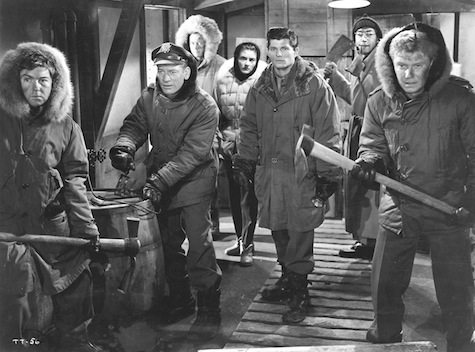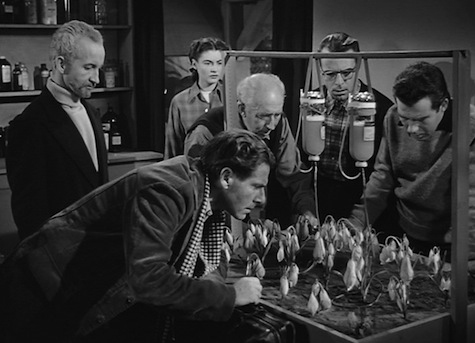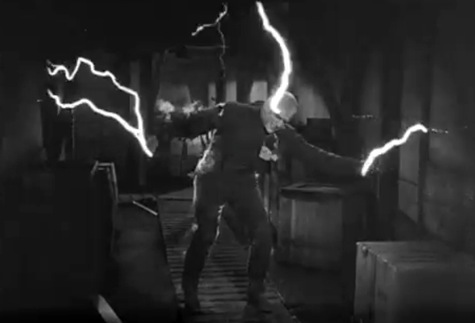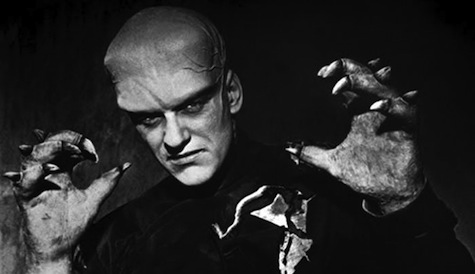“I’ve tried to tell you before, scientists have always been pawns of the military.”
I can’t speak to the relationship between scientists and military personnel in Starfleet, but David’s warning to his mother, Dr. Marcus, in Star Trek II: The Wrath of Khan neatly underlines the antagonism between the eggheads and the meatheads in so much of science fiction. The scientists see the military as a bunch of trigger-happy morons, while the soldiers see the scientists as a bunch of troublemaking nerds who do more harm than good.
You can probably trace the intensity of this mutual distrust back to the dawn of the atomic age, when the militarization of science produced the means to kill everyone on earth. The animosity is certainly on full display in one of the key science fiction films of that era, 1951’s The Thing From Another World. In the film, scientists and Air Force officers stationed at the North Pole discover a wrecked UFO. They uncover a body encased in ice near the wreckage and transport it back to their base just before a storm blows in and cuts them off from the outside world. Then, of course, the thing in the ice thaws out.
On the surface, this is just the standard Us Against The Creature business. Aside from the threat posed by the rampaging Thing itself, however, the main source of tension in the film comes from the battle of wills between the lead scientist, Dr. Arthur Carrington (Robert Cornthwaite) and the ranking Air Force officer Captain Patrick Hendry (Kenneth Tobey). Dr. Carrington wants to study the Thing. Hendry pretty much just wants to kill it.

Unsurprisingly, the film sides with Hendry. The only real ambition this film has is to be entertaining, and brave heroes battling a mindless monster at the North Pole is pure popcorn fare. The Thing From Another World was produced by the great Howard Hawks. One of the undisputed giants of motion pictures, Hawks directed masterpieces across a wide spectrum of genres, including screwball comedies (His Girl Friday, Bringing Up Baby), romantic adventure (Only Angels Have Wings, To Have And Have Not), film noir (The Big Sleep) and westerns (Red River, Rio Bravo). He didn’t direct The Thing From Another World—he assigned that task to his editor Christian Nyby—but he produced it through his company Winchester Pictures.
The movie certainly feels like something that has come from a production company named after a Western rifle (Winchester was also Hawks’ middle name). Like so many Hawks pictures it is about decisive, strong-willed men in a pitched battle for their lives. The screenplay by Charles Lederer (with uncredited assists from Hawks and Ben Hecht) was loosely based on the novella “Who Goes There?” by John G. Campbell. The plot was simplified—as was the nature of the Thing itself—and the characters were brought more in line with the usual Hawksian he-man protagonists. The Hawksian hero doesn’t stop to consider his actions. He just acts, usually with good outcomes.

Having said that, however, the film handles the scientists led by Dr. Carrington in a way that, while clearly presenting them as being in the wrong, nevertheless gives them the benefit of a perspective. Hawks was asked once in an interview if he was criticizing the scientists. He answered:
Oh, it just worked out that way. We had to make it plausible why they let the Thing live, and we did that by turning the scientists into heavies. But it had to be an honest sort of dedication on their part.
That “honest sort of dedication” comes across in the film. Dr. Carrington is clearly fascinated with the visitor from another planet. “There are no enemies in science, only phenomena to be studied,” he argues. While the soldiers are driven by emotion, the good doctor is driven by a desire to understand the workings of the universe. He’s clearly willing to sacrifice for it, too, noting at one point that “Knowledge is more important than life.”
Here’s where The Thing From Another World, in its goofy sci-fi horror romp kind of way, gets at an almost irresolvable tension in the modern world. Captain Hendry wants only to live. Doctor Carrington wants only to understand. The movie sides with Hendry because, as Hawks once told another interviewer, “The best drama for me is the one which shows a man in danger[…]To live or to die. What drama is greater?” Fair enough, the struggle to survive is indeed the essence of good drama. But the doctor has a point, too, doesn’t he? Within the simplified structure of the story here, the doctor is the only one who seems to hold any interest in what a being, with the technological capacity to transverse the stars, might be thinking.
Of course, in the end, he’s just thinking “Mm. Kill. Kill.” The nature of the Thing is much changed from Campbell’s story, and he’s been turned into something that reminds me of Alan Moore’s regenerating-vegetable man take on Swamp Thing. Only dumb. And evil. And bloodsucking.

Dr. Carrington is presented as a villain—as scientists so often are in these kinds of movies—because he’s too brainy to see the obvious truth that the Thing is a monster rather than a superior life form. The root of his obtuseness is revealed in a bit of throwaway dialogue where he praises the Thing by saying, “Its development was not handicapped by emotional or sexual factors.” Actor Robert Cornthwaite puts a lusty sort of spin on this line, as if savoring the idea of being free from emotional and sexual complications.
The film presents this as a contrast to Captain Hendry who is chasing Carrington’s secretary Nikki (played by Margaret Sheridan). While Hawks movies are obsessively male-centric, his few female characters tend to be smart and strong. Though he’s a man of action, Hendry seems flustered around Nikki, and the two share an odd scene where she ties him up and feeds him as part of a kinky game. In the end, however, Hendry slips free of his ropes—a sign perhaps that a man of action ultimately knows how to manage sex and emotion in a way that the intellectual cannot.
Psychosexual readings aside, The Thing From Another World presents a world that is caught in the unsteady balance between Us and Them—that is to say, between the normal people and the people who are a little too brainy for their own good. There’s still a strand of this thinking in popular sci-fi (something like Transcendence, for instance), but it has its counterbalance in films that present the he-men as more of the problem (something like Avatar leans this way). It is a conflict that doesn’t look to be resolved any time soon. In fact, to hear David Marcus tell it, it’s still going to be a problem in the 23rd century.
Jake Hinkson is the author of the novels Hell On Church Street and The Posthumous Man, as well as the novella Saint Homicide. Read more about him at JakeHinkson.com and his blog, The Night Editor.










